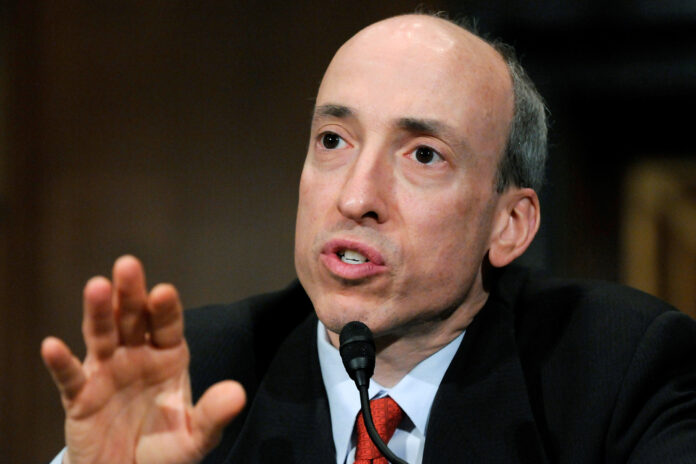Image courtesy of the New York Post
- The SEC chair talked about why the SEC went after Ripple for the sale of its XRP token, saying that the firm violated longstanding securities regulations.
- He also talked about why he has continued to reject Bitcoin spot ETFs from the likes of Fidelity and Grayscale as well as the recent BlockFi $100 million settlement.
Before he took over as the chairman of the Securities and Exchange Commission, Gary Gensler was hailed as a crypto-friendly regulator and many expected a fresh beginning for the crypto industry. It’s been anything but. He has clamped down on crypto companies, and in a recent interview, he has revealed that the SEC is still firmly going after Ripple.
Gensler appeared in an interview with Liz Claman on Fox Business to talk crypto, delving into BlockFi, the crypto invasion of Super Bowl ads, Ripple, Ethereum, Bitcoin spot ETFs and more.
The SEC will continue to crack down on any crypto that it believes is an unregistered security, Gensler said. On what makes one crypto a security and not another, he told Fox:
The conceptual framework is, ‘Is the public investing money anticipating profits on the efforts of others?’ […] My predecessor Jay Clayton said it as well as I could say it, that in looking at these tokens, it’s rare to find one that isn’t doing that. The public is investing hoping for a profit based on the efforts of some other group.
Liz doubled down on why XRP was specifically targeted, drawing to the popular argument of “why XRP and not Ethereum when they both sold their tokens to fund the development of their networks?”
Gensler avoided answering the direct question of why XRP and not Ether, telling Fox that he doesn’t comment on specific cases.
BlockFi settlement and rejecting spot ETFs
As CNF reported days ago, the SEC fined BlockFi $100 million as part of a settlement for offering unregistered securities products with its interest-bearing accounts. The crypto lender also pledged to stop opening new accounts in the U.S.
According to Gensler, the settlement was critical in the SEC’s fight against platforms that fail to offer adequate investor protections against fraud and manipulation. BlockFi, in particular, had violated two separate securities legislations.
But we’re working with them. We’re trying to see if we can get this whole area – these crypto exchanges and lending platforms – inside an investor protection envelope and then if the public wishes to invest or even speculate, that’s up to the public.
Gensler also talked about Bitcoin spot ETFs, a product that the SEC has refused to approve. It has rejected applications from Fidelity, SkyBridge, Kryptoin, VanEck, and WisdomTree. In its latest move, it opened up for public feedback on the Grayscale Bitcoin spot ETF application, although as CNF reported, 95 percent of investors support Grayscale.
Read More: 95% of U.S investors support the Grayscale Bitcoin spot ETF application as SEC delays decision
He says that at the moment, the market doesn’t have an investor protection framework in place for the underlying Bitcoin cash market. This is unlike in Bitcoin future ETFs where these futures trade on the Chicago Merchantile Exchange which is regulated by the CFTC.
Credit: Source link






















 Bitcoin
Bitcoin  Ethereum
Ethereum  XRP
XRP  Tether
Tether  Solana
Solana  USDC
USDC  Dogecoin
Dogecoin  Cardano
Cardano  Lido Staked Ether
Lido Staked Ether  TRON
TRON  Wrapped Bitcoin
Wrapped Bitcoin  Wrapped stETH
Wrapped stETH  Chainlink
Chainlink  Avalanche
Avalanche  Sui
Sui  Stellar
Stellar  Litecoin
Litecoin  Shiba Inu
Shiba Inu  Toncoin
Toncoin  Hedera
Hedera  LEO Token
LEO Token  USDS
USDS  Hyperliquid
Hyperliquid  Polkadot
Polkadot  WETH
WETH  MANTRA
MANTRA  Bitcoin Cash
Bitcoin Cash  Ethena USDe
Ethena USDe  Bitget Token
Bitget Token  Wrapped eETH
Wrapped eETH  Uniswap
Uniswap  Monero
Monero  NEAR Protocol
NEAR Protocol  Pepe
Pepe  WhiteBIT Coin
WhiteBIT Coin  Aave
Aave  Ondo
Ondo  Bittensor
Bittensor  Aptos
Aptos  Internet Computer
Internet Computer  Dai
Dai  Official Trump
Official Trump  Ethereum Classic
Ethereum Classic  Mantle
Mantle  Tokenize Xchange
Tokenize Xchange  OKB
OKB  Gate
Gate  sUSDS
sUSDS  Coinbase Wrapped BTC
Coinbase Wrapped BTC 
